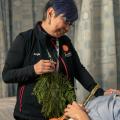Heart ultrasound (echo)
Learn more about the two kinds of heart ultrasounds (TTE and TEE), how to prepare and what to expect.
Overview
An echocardiogram (Echo) uses sound waves (ultrasound) to create a picture of your heart. This shows the shape, texture and movement of your heart valves. It also shows the size of your heart chambers and how well they are working.
Doctors may order an Echo to assess various heart conditions, such as:
- heart murmurs
- structural heart conditions
- damage to heart muscle in those who have had a heart attack
- infections in the heart.
There are two types of Echo: Transthoracic Echo (TTE) and Transesophageal Echo (TEE). Please be sure to know which one you need.
Preparing for the test
Transthoracic Echo (TTE)
- Bring your BC Services Card
- Wear a loose-fitting shirt that's easy to remove
- In the room, someone will ask you to change into a gown.
Transesophageal Echo (TEE)
- Bring your BC Services Card and wear comfortable clothing.
- The night before this test, do not eat or drink anything after midnight.
- Continue to take all your medicines as directed by your doctor. Drink only enough water as necessary to swallow your pills.
- Bring a list of the medicines you take regularly.
- Please arrange for someone to pick you up and take you home; you are not allowed to leave the hospital alone.
- You cannot drive or travel alone for the next 24 hours, so make sure you have a plan for that.
During the test
Transthoracic Echo (TTE)
A specially trained technologist will place a gel on your chest. They will then run a wand (ultrasound probe) over your chest to get different views of your heart. Most patients don’t experience any discomfort. The test takes about 30 minutes, but please allow for one and a half hours.
Transesophageal Echo (TEE)
We do this test by passing a probe through your mouth and down your esophagus (food passage to your stomach). This allows us to get up close to your heart and see how it is working. You will receive medicine to make you drowsy and relaxed for this test.
After the test
There are no significant side effects to this test.
A doctor will assess your test results and call you to explain the results within two weeks of your test. If you have not heard after two weeks, please get in touch with the healthcare provider that referred you.
Support for Indigenous Peoples
The Indigenous Wellness Liaison Team is here to support your health journey. Team members offer cultural support and healthcare advocacy. Learn more below or call them at 604-682-2344,62937 or email IWL@providencehealth.bc.ca.
Education & resources
Patient education
Useful resources
Location
For Transthoracic Echo (TTE)
Cardiac Echo Department
Room 2350, Providence Building, St. Paul’s Hospital
Once in the hospital, follow the red line up the stairs and take a Tower Elevator to the 2th floor of the Providence Building. The Echo Lab is room 2350 is on the left side of corridor.
For Transesophageal Echo (TEE)
Cardiac Short Stay Unit
5th Floor, Providence Building, St. Paul’s Hospital
Once in the hospital, follow the blue line up the stairs and take a Tower Elevator to the 5th floor of the Providence Building and look for a sign that says Cardiac Short Stay Unit.
Transportation & parking
Remember to allow time before your test to get from your car or transit to the test area. When you arrive at St. Paul’s Hospital, enter through the main doors off Burrard Street. If you are not sure where to go, ask a volunteer or the Information Desk for directions. You'll need to tell them the name of the building: Cardiac Echo Department for (Transthoracic Echo) or the Cardiac Short Stay Unit for (TEE).
Hours
Monday to Friday
7:00 a.m. — 7:00 p.m.
